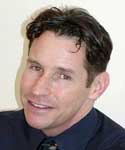-
- Despite accolades in death, Reagan legacy still troubles many
- Transgender community watching teen’s slaying case
- State pulls funding for GLBT Center’s anti-smoking efforts
- Criminal charges dismissed against West
- Pride parade held for first time since same-sex marriage legalized
- Activists urging Virginia boycott over anti-gay law
- National News Briefs
- World News Briefs
commentary
Protecting teachers from hateful students
Published Thursday, 17-Jun-2004 in issue 860
Beyond the Briefs
Now that California law finally allows teachers to be openly gay, and to be protected from bias, we now enter the stage where GLBT teachers can seek to be protected from abuse in the classroom. A few years ago an Oceanside teacher successfully sued a school district for bias when it failed to take reasonable steps to prevent her from abuse from fellow staff at her school. Now a case involving another teacher from a north county school district, Fallbrook, is making its way through the courts.
As reported by GLT Senior Reporter Travis Bone several weeks ago, Tad Garland was a ninth grade math teacher at Fallbrook Union High School (FUHS) who suffered from harassment in his school. Garland had moved to San Diego from Colorado four years ago. During his first two years at FUHS, he had two gay insults directed at him. Garland was not “out” at the school; he realized Fallbrook is very conservative and being openly gay could lead to problems. During his third year, however, he heard three more insults. By this time Garland had tenure and he decided to take some action. He filed a complaint with school officials.
“Kids shouldn’t be allowed to say ‘You fuckin’ faggot’ to a teacher and get away with it,” Garland told this paper recently. He also noted that students were harassing students, but that school officials just didn’t care.
We often hear about the trauma GLBT students face in schools when they suffer physical and emotional abuse. The situation is even worse for GLBT faculty. Hateful students and their parents can make life miserable for teachers. It’s not just insults and taunts — a completely false and unfounded charge of sexual contact, or no charge at all, can lead to the district placing a teacher on leave.
Which brings us back to Garland’s case: In response to his complaint regarding abuse from students in the classroom, the district placed Garland on paid administrative leave in August 2003. He remained on paid medical leave until February of this year, when the district forced him to take a non-teaching post at Ivy High School, a satellite branch of Fallbrook Union.
Hateful students and their parents can make life miserable for teachers. Instead of filing a lawsuit, Garland chose to exhaust his administrative remedies. This means he notified the various federal and state administrative agencies, which must investigate and take action when teachers (or students) complain of bias. He filed a complaint with the California Department of Fair Employment and Housing (CDFEH), which has responsibility for investigating and taking action in gay bias cases. Mistakenly, CDFEH told Garland that, because he was harassed by students and not fellow employees, the agency had no jurisdiction.
That’s not true. The California courts and the Legislature have made it clear that California law specifically applies to harassment by non-employees of a person’s employer. Garland also filed complaints with the Office of Civil Rights (OCR) within the Department of Education. The OCR indicated in April that it is investigating claims of retaliation by the district against Garland. However, the OCR claimed it has no jurisdiction over the charges of sexual-orientation discrimination because federal law doesn’t cover gay bias.
That’s also not true. Federal courts have consistently ruled now that federal laws prohibiting gender discrimination in education and employment apply with equal force to “gay” bias (because it is a form of gender-stereotyping bias). This was not an issue under the Clinton administration, when Richard Reilly was Secretary of Education. Senators Diane Feinstein and Barbara Boxer should question why Rod Paige would not investigate claims of bias that flow from federal law.
California law, though, is clear in that it requires schools districts, when notified of abuse, to take reasonable steps to eradicate the abuse. In a recent court case, Salazar v. Diversified Paratransit, Inc., the California courts indicated that they had misinterpreted the California statute prohibiting sexual harassment on the job. Courts had limited it to cases involving abuse by supervisors and co-employees. But the legislature made clear in 2003 that the statute always applied to harassment by non-employees too.
The Government Code now states that an “employer may also be responsible for the acts of non-employees, with respect to sexual harassment of employees, applicants, or persons providing services pursuant to a contract in the workplace, where the employer, or its agents or supervisors, knows or should have known of the conduct and fails to take immediate and appropriate corrective action. In reviewing cases involving the acts of non-employees, the extent of the employer’s control and any other legal responsibility which the employer may have with respect to the conduct of those non-employees shall be considered. An entity shall take all reasonable steps to prevent harassment from occurring. Loss of tangible job benefits shall not be necessary in order to establish harassment.”
School districts have control over students. When a student abuses a teacher, school districts need to take immediate action. Schools can remove a student from a class, suspend or expel the student. If a parent is doing the abusing, schools can bar the parent from entering the campus or contacting the teacher.
One thing that George Bush has championed is school choice. If a parent does not want his or her child to be taught by a GLBT teacher in a public or private school, the choice is simple: Home school.
|
|
Copyright © 2003-2025 Uptown Publications


